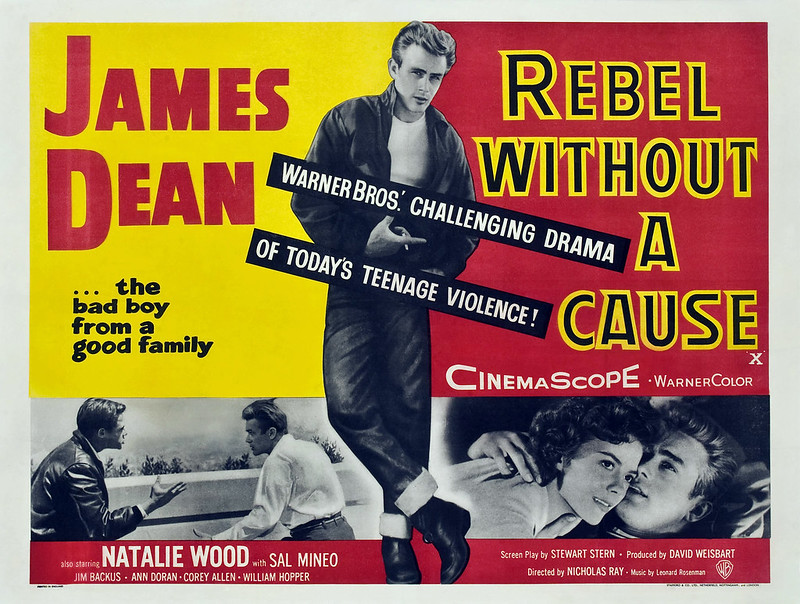Rebel Without a Cause (1955) is a film that may show up at some point at the Pickwick Theatre Classic Film Series, but it won’t be because I want to see it. Nicholas Ray was a great, intuitive filmmaker, and Rebel will be remembered as his most famous movie, if not necessarily his best effort. But Rebel strikes me as phony and old-fashioned, and it remains very much a ‘problem’ film in the old Warner Bros. style of the ’30s.
The set-up of the troubled teens unable to cope with (then) contemporary society and unable to come to terms with their parents’ generation seems simplistic, and the easy solutions smack of dime store philosophy. My great hang-up is James Dean, who forever remains the voice of and the icon for frustrated youths everywhere– a cult that continues to flourish as a style accessory more than 60 years later. You think of the ’50s, you automatically think of Dean and Marilyn Monroe, and if you’re political, Eisenhower with a golf club.
To me, Dean’s legendary status has falsely inflated whatever edgy talent he may have had. His fame is derived more from the fact he is a symbol of the times. I don’t know what he showed on the screen was much removed from the real guy: erratic, inarticulate, moody temperament. His death, at a time when that type of screen character was at its peak, solidified his rebel image. But what was he going to do after that, play the troubled teen right into his ’60s? Maybe he could have developed into a seasoned character actor over the years. I do know he was ludicrous as the elder Jett Rink in the second half of Giant, make-up and all.
That aside, another reason Rebel isn’t a personal favorite is the sight of Jim Backus as Dean’s weakling, Walter Mitty-of-a-father. I just cringe watching that guy prance around in his wife’s apron, dithering like Mel Tillis-on-acid. And he’s always been a good supporting player otherwise. And I’m not keen on that long, drawn-out sequence with Dean, Natalie Wood and the creepy Sal Mineo in the deserted mansion. And William Hopper’s stern rejection of daughter Wood at every turn is pretty weak stuff– and obvious.
I have no problem with Ray’s direction, especially in blocking scenes for a Scope format, but the characterizations and dialogue given them just drive me to distraction. That’s always been my take on it, and maybe another viewing would make me re-evaluate it, but give me Ray’s In a Lonely Place for solid entertainment.
~MCH
